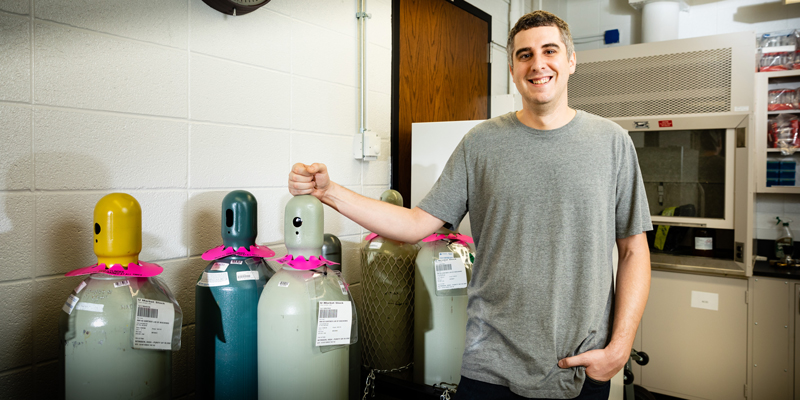New faculty member Kyle Costa seeks to understand how methanogens produce methane.

Natural gas is used every day to heat homes, produce electricity, and power gas stoves. Its main component, methane, is mostly produced by a type of archaea called methanogens. Despite their importance in the production of natural gas, very little is known about these methane-producing archaea. Kyle Costa, a new faculty member in the Department of Plant and Microbial Biology, studies the metabolic pathways responsible for the production of methane, which is both a valuable resource and a potent greenhouse gas.
Costa looks for genes play a key role in the metabolic pathways that underlie methanogenesis. When he finds a likely suspect, he uses gene-editing techniques to knock out, or delete, the gene. Then he observes what happens to the methanogen’s activity. “You can think of pathways in methanogens a lot like parts of a car,” says Costa. “Cars have a lot of working parts, and if you knock out a gene in a methanogen, it's similar to what happens if you take the steering wheel off of the car.” By understanding how genes contribute to methane synthesis, Costa can begin to track key pathways that regulate its production.
If successful, Costa hopes to make the process more efficient. One of the most promising applications is in wastewater treatment. Methanogens break down contaminants in water and convert them into methane. This gas can then be harvested and used as energy to help power the plant, making wastewater treatment an energy-neutral process. In this way, the microscopic archaea we depend on for wastewater treatment could become an important part of a greener future.
Costa is hopeful his work will lead to commercial applications in energy production. “What I would like to be able to say is this is the pathway, this is how it works, these are all of the inputs, these are all of the outputs so that people in the future can think about how to engineer that pathway in a way that will benefit many applications.”
Though still in the early stages, the research could lead to the more efficient, greener production of natural gas. “My focus is understanding how mother nature does it. Once we know that, then we can start thinking about how can we alter what mother nature does to our advantage.” –Shannon Allen